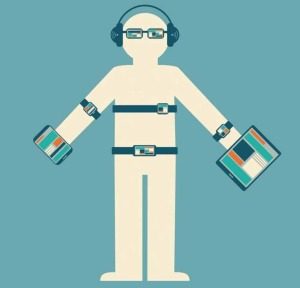Prediction season is nearly upon us. It’s that time of year where companies start looking ahead and reflecting on lessons of the past. Let’s start by looking back at my 2015 predictions.
Wearable-Schmearable
Wearables continued to generate a lot of hype, but in my view, there’s still a long way to go before they have a meaningful impact on anybody’s life – including my own.
While it turns out the Apple Watch was the must-have tech gadget for Apple fanatics, it “is still probably not for you,” as the New York Times puts it. Why? Well, I’ve come to discover that the killer app for the Apple Watch is in fact… the clock! I use my Apple Watch when I’m coaching the kids’ soccer to figure out when time is up… but that’s about it. And the downside? Now when a call comes in, my MacBook, iPad, iPhone… and now my watch all light up with that familiar samba tune.
Does this mean the Apple Watch is a failure? Of course not, otherwise I wouldn’t have bought one. On the other hand (or wrist), niche wearables like Fitbits did shake up industries for the better. IDC noted that not only did Fitbit “experience triple-digit year-over-year growth,” it also built an ecosystem by partnering with corporate wellness groups, fashion and food companies.
Consumers “Caught In The ‘Act’
Okay, I’ll admit that not every retailer started to track your movements through their stores. But a few have. Target began testing a beacon system in 50 stores that will be able to tell where customers are in the store and use that information to send targeted deals to their smartphones. I’ll add that a key sign momentum is building is when the FTC takes interest – which they did in 2015, telling retailers that they have to let you know when they’re watching.
 It’s About The Software
It’s About The Software
Did software continue to redefine industries? You bet. Tesla upped the ante for the car industry once again by introducing “Autopilot” and eliminating the need for an active human driver – well almost. The best bit? No Tesla owner had the Autopilot feature when they bought their car! Turns out that automatic software updates are not just for phones. Even more shocking… it didn’t cost us Model S owners a penny. Your move, Google.
Sling TV made it easy to cut the cord (while being able to get all your TV on phone and tablet), while the Drizly app went mainstream in bringing one-hour alcohol delivery to several US states – without actually supplying any of the alcohol purchased and delivered through their service.
Agile Software Development + Millennials = New IT
Unless you’ve been living under a rock, it was impossible not to hear the word “DevOps” at least a few times a day in 2015. Key to the DevOps model is moving to a development methodology that is both iterative and capable of continuously integrating new capabilities.
As every industry is transformed by software, this will be THE model that almost every company moves to. Our very own Pivotal Cloud Foundry has seen explosive growth in 2015 with adoption by the Who’s Who of the Fortune 500. Together with Pivotal Labs, Cloud Foundry has been reinventing software development in companies large and small.
Lecture This
Technology made a significant impact on education this last year, with curricula offered online from anywhere. Specific to last year’s prediction, it has indeed given the masses access to the same materials Ivy League schools teach. EdX and Coursera actually competed throughout 2015 to sign up the most Ivy League schools.
Of course I’d be remiss not to mention that we at EMC made our own contribution: we introduced our Data Lakes For Big Data MOOC earlier this year, which delivers a foundational understanding of data lakes and big data to anyone who wants to learn, free of charge. We think this is important because we see data lakes as a critical underlying technology that will transform every industry and we believe it’s critical to educate as many people as possible on why and how. We plan to do quite a bit more in this space, so keep on the lookout.
Looking back at 2015, I think I did pretty well. But what do you think? How will technology continue transforming our world in 2016?